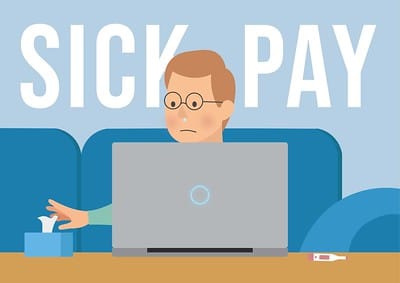Being a freelancer gives you all that immense freedom but it’s not all rainbows and sunshine. Like all other employed humans, you’re likely to get sick once in a while. Having a freelance job, however, could lead to some complications as far as sick days are concerned.
Are you entitled to a sick leave when you’re your own boss? What happens with your income when you can’t work for a few days or maybe even a few weeks?
These are some important questions you should probably get clarity on in the beginning of your freelance career.
Find Out if You’re Entitled to Paid Sick Leave
Paid sick leave could be a viable part of having a freelance job, depending on the country that you live in.
Some countries, especially in Europe, have you making monthly installments towards a paid sick leave plan. When you get ill, the state will give you compensation for the days during which you were incapable of working.
To find out if you’re entitled to such an option, you should speak to an accountant. Bookkeepers will give you a good idea about your options, the amount you’ll have to spend each month on such a plan, and the compensation you’ll receive in the event of getting sick.
While spending money each month on something you’ll need occasionally may seem wasteful (especially at the beginning of your freelance career), it’s a nice safety net. Even the healthiest people can experience medical problems every once in a while. Some of those will lead to the loss of income – an issue that you don’t want to be dealing with when you’re sick.
Consider Insurance Before Starting Your Freelance Job
If paid sick leave isn’t an option, consider getting some type of insurance that will offer financial protection in the event of becoming ill.
Health insurance plans abound, some of them giving you more comprehensive coverage than others.
Income protection insurance is also a thing. It’s especially popular in the UK but could also be available in the country that you live in.
In the event of becoming sick, the income protection insurance will give you regular payments that will replace the amount you didn’t get to earn because of your illness. You will receive payments until you get cleared by a medical professional and start doing your job again.
Income protection insurance is an especially valuable tool for freelancers who don’t have anything else to fall back on. The cost will depend on several factors – from your age to your occupation and your health status. Do some research and compare a couple of quotes side-by-side before choosing. Don’t just base the decision on the cost of the insurance, pay attention to the coverage, as well.
Take Some Time Off

Image by: Microbiz Mag
Most freelancers have tried to push through an illness and continue working while they were under the weather.
Such a scenario could be successful if you’re down with something small like a cold.
Pushing through illness and working while you’re not feeling well, however, isn’t always the best approach. Not taking some time off to recover could easily prolong the number of days you’ll need to feel back to your normal self.
Instead, give yourself a few days of complete rest. Go to bed, have some hot tea, watch your favorite shows, or read a book. Giving your body a break will speed up the recovery and allow you to get back to your freelance job faster.
Which brings us to the next point:
Communicate with Your Clients as Soon as You Start Feeling Unwell
Don’t wait to be hospitalized before communicating with clients about your condition.
It’s a good idea to let clients know you’re feeling a bit shaky. They should be warned in advance about an eventual sick leave, giving them enough time to reorganize work processes and handle urgent tasks in another way.
Telling a client that you wouldn’t be capable of finalizing a project is much better than trying to finalize the task and failing miserably. Giving them an early warning shows that you are a responsible and reliable individual. Establishing your trustworthiness means that the client will most probably get back to collaborating the moment you start feeling better.
Delegate Some Tasks if That’s an Option
As a reliable partner, you should also consider giving your clients a plan B whenever you get sick.
Do you have a well-established professional network? How often do you communicate with other freelancers who specialize in the same area?
These connections can be incredibly beneficial at a time of need.
If you know that someone can do a really good job, refer a client to them.
Delegating some tasks and projects will probably seem counter-intuitive. After all, nobody wants to give up the business contacts that they’ve worked so hard to establish.
Outsourcing some of the work, however, will give you much-needed time to recover. Your client will also get the work finalized in time. It’s a win-win for both parties involved. You’ll also be doing someone a professional favor and that person will probably do the same for you when the time is right.
Keep the Lines of Communication Open
You have notified your existing clients about being sick and you can call it a day, right? That’s not exactly the case.
As a part of your freelance job, you probably get lots of emails about business offers and projects that you may decide to eventually take on. Even if that’s not the case at the beginning of your freelance career, it will become a part of your reality eventually.
If you decide to take some time away from your freelance job, you should definitely consider auto responses to such email inquiries.
Set up an automatic email that everyone will receive for the period you take sick leave.
Let potential clients, business partners, and everyone else know you’ll be away from the “office” for a while. Give a date on which you’ll respond to inquiries.
Dealing with all these emails the first day you get back to work is certainly going to feel like a major nuisance. Still, you’ll need to power through the communication session, showing people you keep your promises.
Deal with the Guilt You’ll Probably Feel About Taking Some Time Off
Being your own boss usually means longer work hours and no days off. After all, the more time you dedicate to your freelance career, the more you’re going to earn.
Most freelancers have adopted this mindset. It’s the one that will make them feel incredibly guilty for the need to take some time off.
Deal with the guilt in a productive way and give yourself a break.
Continuing to work while you are sick will often mean doing an inferior job. You will be distracted. You’ll feel unwell and that state will almost definitely impact the quality of the work that you do. Instead of delivering something mediocre on time, give your client a warning and produce a stellar piece of work the moment you start feeling better.
In order to be a good professional, you need to maintain a good work-life balance. Guilt has no place in this equation and it will only damage your career in the long run.
Learn from the Mistakes You Made
If you’re dealing with a freelance sick leave for the very first time, you are probably noticing some stupid mistakes that could have been avoided easily.
Use that experience to prepare for your next sick leave.
Put some money aside and use it to cover the loss of income you’ll experience while you are recovering from an illness.
Establish your professional network, partner up with an experienced accountant, and choose the methods of communication that will benefit both you and your clients.
Having an action plan in place will streamline things the next time around. Obviously, you will get sick again in the future. By having a sick day scenario in place, you’ll reduce the risk of losing clients or having to push through the sickness in order to get a job done.
Final Thoughts
Having sick days as a freelancer is very similar to getting ill while you are employed. Still, there will be some distinctive challenges you’ll need to address on your own. There isn’t going to be a boss or coworkers who can handle a project on your behalf. You’ll also lack insurance that your employer makes available to help you cover medical expenses.
Understanding these specifics and knowing how to tackle them will give you peace of mind during sick days. You’ll also need to determine what the best way to communicate with clients is. Once you come up with a way to handle these specifics, you’ll find it much easier to deal with an illness without guilt or worries.







